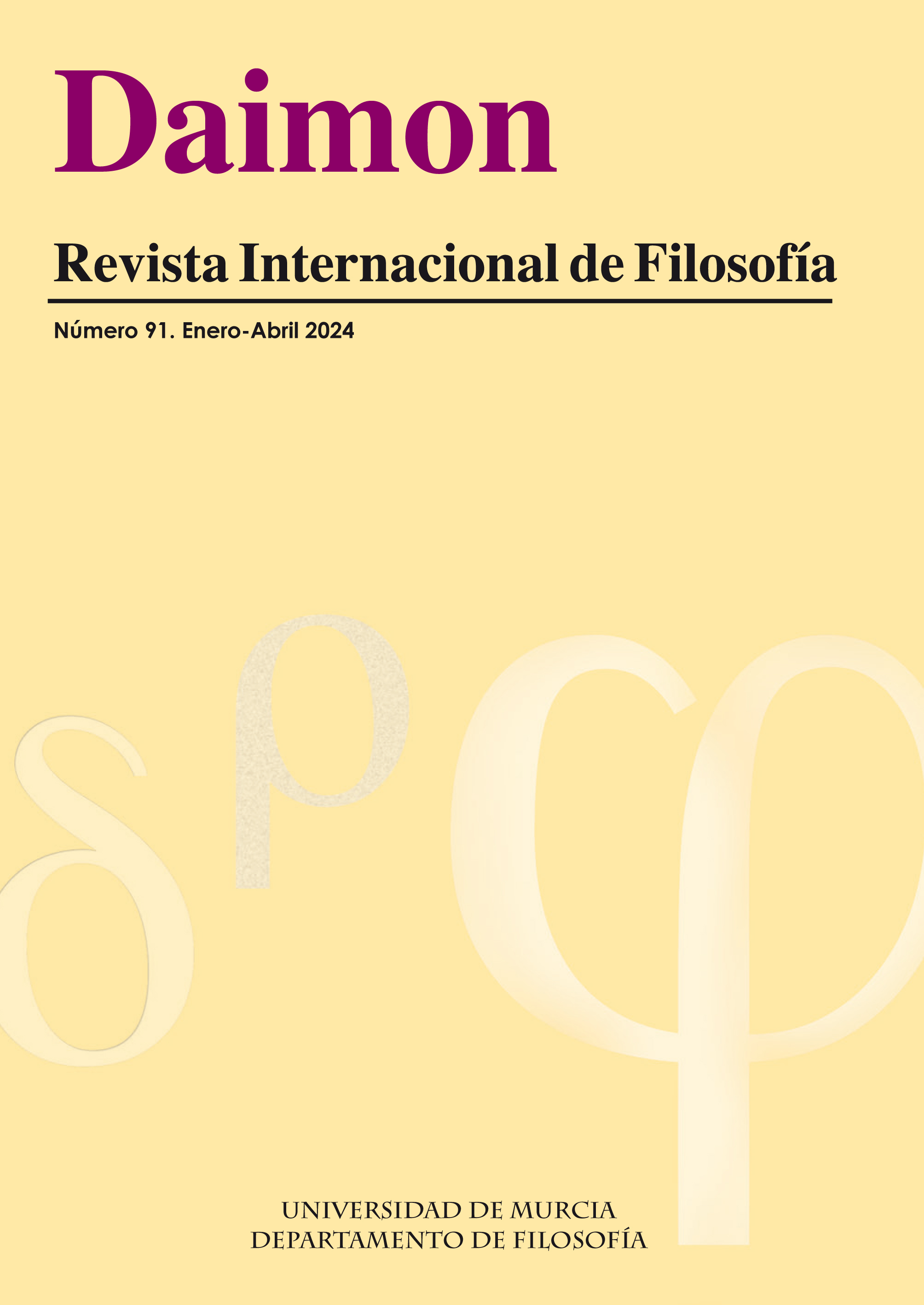El estatus ontológico de los posibles en la intelección divina: Juan Duns Escoto y Guillermo de Alnwick
Agencias de apoyo
- Es Becario Postdoctoral UCA- CONICET con un proyecto titulado La inteligibilidad de los posibles: resignificación de la teoría modal de Duns Escoto en el joven G. W. Leibniz, aprobado por Resolución RESOL-2020-652-APN-DIR#CONICET.
Resumen
En las últimas décadas, la teoría epistemológica de Juan Duns Escoto ha sido objeto de interés por combinar los aspectos metafísico y semántico, los cuales le permiten distinguir la intelección, un evento cognoscitivo real, de su ‘contenido’ específico. En este artículo abordaremos el conocimiento divino de las posibles creaturas, preguntándonos si el Doctor Sutil le atribuye a su ser inteligible, esse intelligibile, algún tipo de realidad ontológica. En discusión con la interpretación de quien fue su secretario, Guillermo de Alnwick, argumentaremos que Escoto se refiere, con aquella expresión, al contenido semántico de la intelección sin ningún compromiso ontológico.
Descargas
-
Resumen689
-
PDF317
-
HTML47
Citas
ALNWICK, G. DE (1937), Quaestiones disputatae de esse intelligibile et de quodlibet, Firenze-Quaracchi: Typographia Collegii S. Bonaventurae.
ARISTÓTELES (1994), Metafísica, Madrid: Gredos.
AVERROES (2018), Traduction comment e du Grand commentaire d’ Averro s aux livres petit Alpha, grand Alpha, Gamma et Epsilon de la M taphysique d’ Aristote (tr. Karim Kaddour). Paris: Université Panthéon-Sorbonne-Paris I.
CROSS, R. (2014), Duns Scotus’s theory of cognition, Oxford: Oxford University Press.
EFFLER, R. (1962), John Duns Scotus and the principle ‘omne quod movetur ab alio movetur’, New York: Franciscan Institute Publications.
ESCOTO, J. D. (1956), Ordinatio I, dd. 4-10, Vaticano: Typis Polyglottis Vaticanis.
ESCOTO, J. D. (1963), Ordinatio I, dd. 26-48, Vaticano: Typis Polyglottis Vaticanis.
ESCOTO, J. D. (1968), Cuestiones Cuodlibetales, Madrid: Biblioteca de Autores Cristianos.
ESCOTO, J. D. (1973), Ordinatio II, dd. 1-3, Vaticano: Typis Polyglottis Vaticanis.
ESCOTO, J. D. (1997), Quaestiones super libros Metaphysicorum Aristotelis, Libri VI-IX, New York: Franciscan Institute Publications.
ESCOTO, J. D. (1998) ‘Reporatio Parisiensis I-A.36’, en: Noone, T. B., «Scotus on Divine Ideas», Medioevo, 24/1, pp. 359-453.
ESCOTO, J. D. (2004), The Examined Report of the Paris Lecture: Reportatio I-A, Prol. dd. 1-21, New York, Franciscan Institute Publications.
ESCOTO, J. D. (2008), Ordinatio IV, dd. 1-7, Vaticano: Typis Polyglottis Vaticanis.
HOFFMANN, T. (2009), «Duns Scotus on the origin of the possibles in the divine intellect», en: Brown, S. F., Dewender, T. y Kobusch, T. (eds.): Philosophical Debates at Paris in the early fourteenth century, Leiden: Brill, pp. 359-379.
HOFFMANN, T. (2011), «Henry of Ghent’s influence on John Duns Scotus’s metaphysics», en: Wilson, G. A. (ed.): A Companion to Henry of Ghent. Leiden: Brill, pp. 339-367. Daimon. Revista Internacional de Filosofía, no 91 (Enero-Abril) 2024
GANTE, E. de (1961), Quodlibet. Paris: Badius, 1518 [reimpr. Louvain: Bibliothèque S.J., 1961].
KING, P. (2004), «Duns Scotus on mental content», en: Boulnois, O., Karger, E., Solère, J-L. y Sondag, G. (eds.): Duns Scot à Paris, 1302-2002. Turnhout: Brepols, pp. 65-88.
KING, P. (2001), «Duns Scotus on possibilities, powers and the possible», en: Buchheim T. et al. (eds.): Potentialität und Possibilität: Modalaussagen in der Geschichte der Metaphysik. Stuttgart: Fromann-Holzboog, pp. 175-199.
MANZANO, G. (2000), Estudios sobre el conocimiento en Juan Duns Escoto, Murcia: Espigas.
MAURER, A. (1950), «Ens diminutum: a note on its origin and meaning», Mediaeval Stud- ies, 12/1, pp. 221-222.
PASNAU R. (2002), The Cambrigde translations of medieval philosophical texts: Mind and Knowledge. Cambridge: Cambridge University Press.
PERLER, D. (1994), «What am I thinking about? John Duns Scotus and Peter Aureol on intentional being», Vivarium, XXXII/1, pp.72-89.
PINI, G. (2015), «Scotus on objetive being», Documenti e studi sulla tradizione filosofica medievale, 26/1, pp. 337-368.
PINI, G. (2020), «Duns Scotus on what is in the mind: A Roadmap», Recherches de théologie et philosophie médiévales, 87, pp. 319-347.
SMITH G. (2015), «Introduction», en: Petrus Thomae, Quaestiones de esse intelligibile. Leuven: Leuven University Press, pp. xi-xc.
SMITH G. (2018). «Esse consecutive cognitum: a fourteenth-century theory of divine ideas», en: Hofmeister Pich, R. y Speer, A. (eds.): Contemplation and philosophy: scho- lastic and mystical modes of medieval philosophical thought. Leiden: Brill, pp. 477-527.
TWEEDALE, M. (2007), «Representation in scholastic epistemology», en: Lagerlund, H. (ed.): Representation and objects of thought in medieval philosophy. Aldershot: Ashgate, pp. 63-79.
VATER, C. A. (2017), Divine Ideas: 1250–1325. Washington: Faculty of the School of Philosophy of the Catholic University of America.
Derechos de autor 2023 Daimon Revista Internacional de Filosofia

Esta obra está bajo una licencia internacional Creative Commons Reconocimiento-NoComercial-SinObraDerivada 3.0.
Las obras que se publican en esta revista están sujetas a los siguientes términos:
1. El Servicio de Publicaciones de la Universidad de Murcia (la editorial) conserva los derechos patrimoniales (copyright) de las obras publicadas, y favorece y permite la reutilización de las mismas bajo la licencia de uso indicada en el punto 2.
2. Las obras se publican en la edición electrónica de la revista bajo una licencia Creative Commons Reconocimiento-NoComercial-SinObraDerivada 3.0 España (texto legal). Se pueden copiar, usar, difundir, transmitir y exponer públicamente, siempre que: i) se cite la autoría y la fuente original de su publicación (revista, editorial y URL de la obra); ii) no se usen para fines comerciales; iii) si remezcla, transforma o crea a partir del material, no podrá distribuir el material modificado.
3. Condiciones de auto-archivo. Se permite y se anima a los autores a difundir electrónicamente las versiones pre-print (versión antes de ser evaluada) y/o post-print (versión evaluada y aceptada para su publicación) de sus obras antes de su publicación, ya que favorece su circulación y difusión más temprana y con ello un posible aumento en su citación y alcance entre la comunidad académica. Color RoMEO: verde.











